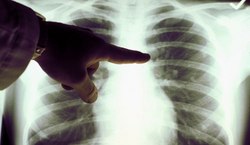 Scientists have learned that the development of lung cancer can be stopped, if to block the ability of tumor cells to switch to other power sources. Opening became possible thanks to the identification of the mechanism that allows cancer cells to change their own preferences in nutrient resources. Scientists have learned that the development of lung cancer can be stopped, if to block the ability of tumor cells to switch to other power sources. Opening became possible thanks to the identification of the mechanism that allows cancer cells to change their own preferences in nutrient resources.
The results of the work of the team described in the journal Molecular Cell. Briefly about the study described in the press release of the ITMO University, arrived in edition "Tapes.ru".
Diet the body's healthy cells and cells affected by cancer varies considerably. Extremely fast the growth of cancer cells is a growing need for energy resources. This need is met in the cells absorption of glucose (sugar) is in the 10's and even hundreds of times more than they consume healthy cells. However when glucose becomes low, the cancer cells are forced to seek other sources of supply in order to ensure its own growth and survival.
Canadian, American, Russian and British scientists have studied how the cells of certain types of cancer, for example lung cancer, are responding to the lack of glucose in the medium. For experiments researchers chose common type of cancer - non-small cell (85 to 90 percent of all cases). As it turned out, when glucose becomes scarce the product is, some cancer cells are ready to change their food preferences and switch from glucose to amino acid glutamine.
The use of glutamine as a nutrient resource due to the fact that cancer cells are starting to work with the enzyme PEPCK: it is embedded in the metabolism of cells, opening the access to energy resources from glutamine. So, the cells are ready to continue to support its own growth even in conditions of unavailability of the main nutrient of the drug. On the basis of this study, the researcher managed to demonstrate that the blocking of the enzyme PEPCK in cancer cells can slow the tumor growth in mice. The group also managed to prove that the affected tissue of patients contain a higher concentration of PEPCK.
"Understanding mechanisms used by cancer cells to sustain rapid growth, leads to new possibilities of healing this disease. Sighting shot on the ability of cells to adapt to the environment through PEPCK-related metabolic pathways may be a successful method of treating some types of cancer", - said Alexey Sergushichev, bioinformatic and graduate student, Department of computer technologies of ITMO Institute (St. Petersburg).
The study definitively confirms the presence in the body environment in which cancer cells are competing for glucose and retain the ability to sharp increase only when switching to other sources of power.
sections: Society
|